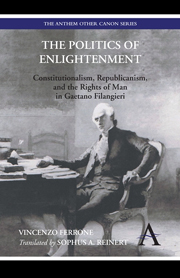 The Politics of Enlightenment
The Politics of Enlightenment from Part Two - A Difficult Legacy
Published online by Cambridge University Press: 05 February 2013
Closing the Commentaire [sur l'ouvrage de Filangier], at a distance, by then, of a hundred and forty years, we can no longer accept, as Constant's generation did, the validity of his verdicts and his critiques. How poorly Constant knew the world of eighteenth-century Naples! He did not understand that many of the contradictions he noted were nothing but attempts to understand the reality which surrounded Filangieri… And how can one not see that Constant did not fully understand that desire for justice and equality which so deeply underlies the eighteenth century, and which the nascent liberalism of the new century would evade in a thousand ways and perhaps hide with a thousand sophisms? Why not feel Filangieri's fear of war, rather than be overcome by Constant's optimism, which saw war excluded and impossible in modern economies and societies?
Franco Venturi, ‘Gaetano Filangieri,’ in Illuministi italiani (1962)Between 1822 and 1824, a strong, unexpected attack on Filangieri appeared in Paris. It was a veritable public trial, masterfully studied and successfully concluded through the publication of two dense, caustic volumes, which culminated with the bitter banishment to oblivion of the entire Enlightenment school of natural law that had emerged in Naples in the second half of the eighteenth century.
In over four hundred printed pages entitled Commentaire sur l'ouvrage de Filangieri, Benjamin Constant, the spiritual father of European liberalism and author of this implacable condemnation, denounced the dangers, the anachronisms, and the possible misunderstandings hidden in the work of the Italian jurist and philosopher.
To save this book to your Kindle, first ensure [email protected] is added to your Approved Personal Document E-mail List under your Personal Document Settings on the Manage Your Content and Devices page of your Amazon account. Then enter the ‘name’ part of your Kindle email address below. Find out more about saving to your Kindle.
Note you can select to save to either the @free.kindle.com or @kindle.com variations. ‘@free.kindle.com’ emails are free but can only be saved to your device when it is connected to wi-fi. ‘@kindle.com’ emails can be delivered even when you are not connected to wi-fi, but note that service fees apply.
Find out more about the Kindle Personal Document Service.
To save content items to your account, please confirm that you agree to abide by our usage policies. If this is the first time you use this feature, you will be asked to authorise Cambridge Core to connect with your account. Find out more about saving content to Dropbox.
To save content items to your account, please confirm that you agree to abide by our usage policies. If this is the first time you use this feature, you will be asked to authorise Cambridge Core to connect with your account. Find out more about saving content to Google Drive.